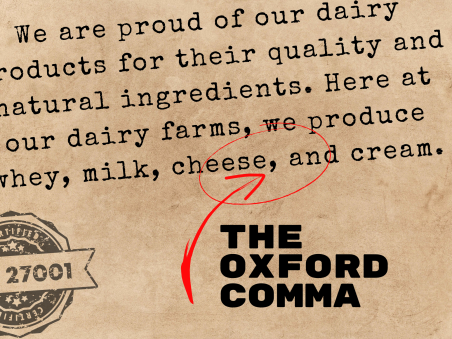If you don’t think bad grammar can cost you, think again. In this case, one teeny, tiny, little comma actually cost one company five million dollars. That’s one expensive comma!

The Serial Comma Strikes Again
An Oxford comma, also known as a serial comma, refers to the final comma in a list of items. It appears before the last item is added. In the sentence, “We produce whey, milk, cheese, and cream,” the Oxford comma appears between cheese and cream.
The Oxford comma is optional in most situations– you can choose to leave it out if the meaning of the phrases is still clear. However, there are situations when the Oxford comma is required to clarify meaning, and this is one of those times.
The Case Of The Missing Comma
In 2014, three drivers at a Maine dairy company filed a lawsuit for lost overtime wages. The workers argued that they were entitled to overtime pay, which is one-and-a-half times the normal pay for any additional hours worked per week.
The company’s original contract stated that certain jobs were exempt from overtime. According to the contract, the following jobs did not qualify for overtime pay:
The canning, processing, preserving, freezing, drying, marketing, storing, packing for shipment or distribution of:
(1) Agricultural produce;
(2) Meat and fish products; and
(3) Perishable foods.
In the long list of exemptions, there is no Oxford comma between shipment and distribution.
If packing is the final job on the list, then dairy drivers (distributors) would be entitled to overtime pay.
If there had been an Oxford comma, then distribution would clearly be a separate job included on the list. But there was no comma in sight. Therefore, it could be argued that distribution was, in fact, eligible for overtime pay, and that was exactly what the drivers were claiming.
Their case was tried by the United States Court of Appeals for the First Circuit, and the courts ruled in favor of the drivers, who were awarded a $5,000,000 settlement to make up for their lost overtime wages for distribution over the previous four years. That’s quite a victory for the drivers– and for all the grammar police out there!
The contract of the dairy company has since been changed to include distribution in its exemptions. This time, the company decided to make it crystal clear by opting for semicolons instead of commas. No surprise there. The contract now looks like this:
The canning; processing; preserving; freezing; drying; marketing; storing; packing for shipment; or distributing of:
(1) Agricultural produce;
(2) Meat and fish products; and
(3) Perishable foods.
With semicolons in place, there can be no denying that distributors are exempt from overtime conditions. (I wouldn’t be surprised if they hired a new contract writer as well!)
The Fine Print of Punctuation
So now that you know the story of the $5,000,000 comma, let’s review the lessons we can learn from this punctuation pitfall:
The Oxford comma is considered optional, but do make sure your sentence meaning is clear if you decide to ignore it! (I always use an Oxford comma, just to be on the safe side.)
Small grammar mistakes can cause big problems. The ability to use (and interpret) a language is a valuable skill that can lead to success in life wherever you go.
Always read the fine print in any contract you sign, because there could be millions at stake– for you, or against you.
If you’re ever in doubt of correct comma usage, please don’t hesitate to ask me. I’ve written out some of the more common comma uses (including the Oxford comma) on lesson plans you can find here.
What are your thoughts on the Oxford comma and this lawsuit? I’d love to hear your opinions, ideas, and reactions in the comments below.
Source: The New York Times, 2018

Psst! Hey teachers! Want a PDF version of this article to share with your students? Say no more! I’ve written it as part of a complete lesson plan on commas. It includes a vocabulary bank and comprehension questions as well. Thanks and Happy Teaching!

